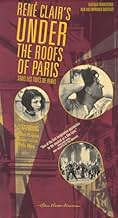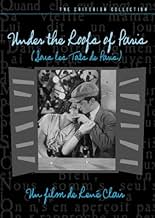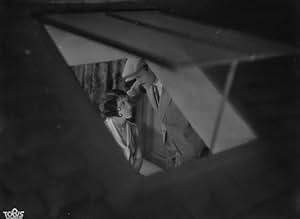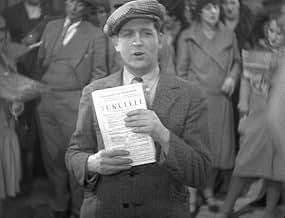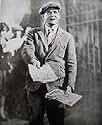IMDb-BEWERTUNG
7,0/10
2602
IHRE BEWERTUNG
Füge eine Handlung in deiner Sprache hinzuAlbert is smitten for Pola but ends up wrongly committed in jail, in the meantime her affections are sought after by his friend, and on his release both love and friendship must be tested.Albert is smitten for Pola but ends up wrongly committed in jail, in the meantime her affections are sought after by his friend, and on his release both love and friendship must be tested.Albert is smitten for Pola but ends up wrongly committed in jail, in the meantime her affections are sought after by his friend, and on his release both love and friendship must be tested.
- Auszeichnungen
- 1 wins total
Edmond T. Gréville
- Louis
- (as Edmond Gréville)
Delphine Abdala
- La buraliste
- (Nicht genannt)
Raymond Aimos
- Un gars du milieu
- (Nicht genannt)
Raymond Blot
- Un membre de la bande à Fred
- (Nicht genannt)
Thomy Bourdelle
- François
- (Nicht genannt)
Léon Courtois
- L'inspecteur
- (Nicht genannt)
Édouard Francomme
- Un membre de la bande à Fred
- (Nicht genannt)
André Michaud
- Un agent
- (Nicht genannt)
Jane Pierson
- La dame du premier
- (Nicht genannt)
Louis Pré Fils
- Le locataire du troisième
- (Nicht genannt)
Eugène Stuber
- Un membre de la bande à Fred
- (Nicht genannt)
Louis Zellas
- Le consommateur jaloux
- (Nicht genannt)
Empfohlene Bewertungen
10zetes
René Clair's early sound films are amongst the best ever made. Le Million (1931), Quatorze Juillet (1933), and Under the Roofs of Paris (1930) are masterpieces of musical comedy and romance (I leave out perhaps his most famous, À nous la liberté, which I need to see again). Under the Roofs of Paris is the loose but good story of a young street singer (Albert Préjean) who falls in love with a girl (Pola Illéry). He has an uneasy relationship with a couple of pickpockets (including Gaston Modot, who also made L'Âge d'or with Buñuel the same year) who like to work when he's demonstrating his talent. In the film's opening scene, there is an amazingly edited sequence of one of these men at work. Everyone wants Pola, including Albert's best friend, Louis, and when Albert is framed for burglary, they don't think twice about going after her. Clair's direction moves like silk. It's so supple. The camera movements, full of crane shots and pans, is technically stunning, especially for the time but even now. And the use of sound is absolutely revolutionary. It's more or less half silent, half talkie. Unlike many early sound films, Clair keeps the dialogue to a minimum, so it's never clunky. Characters only speak when they have to; at other times, they gesture. The film is often described as a musical, but it is not. There are two songs, and the music arises diagetically from an accordion player. The music, and the use of music, are quite amazing. This is one of the most wonderful movies ever made.
The film marvellously shows the nostalgic dream of the old Paris and its common people. With melancholic irony, Clair tells a story of the milieu of backstreets and backyards, of street singers, pickpockets, fiddlers and strange townsmen. Here, his grasp into the present does not become realistic depictions of circumstances, but a poetic romance, for which reality is only one aspect of life.
In this regard, especially the sound has turned out quite well. And how hesitantly Clair used this new technical innovation! His generally critical attitude towards sound in films induced, that "Sous les toits" is mainly composed of silent parts (including many dialog scenes), which are highlighted with music or noises such as trains driving past. The song "Sous Les Toits De Paris" of Albert, the street singer, becomes to the red thread which links several scenes and bridges time distances. A fight taking place in the dark only informs the viewer through noises. For that, we witness a dispute, where the matter is uninteresting and predictable, without any sound - shot through a glass door. One can say sound is especially used for enrichment and left out when it would be needless. Thus, a film came into being that wonderfully combines sentiment, humor and intelligence with languishingly beautiful tunes.
In this regard, especially the sound has turned out quite well. And how hesitantly Clair used this new technical innovation! His generally critical attitude towards sound in films induced, that "Sous les toits" is mainly composed of silent parts (including many dialog scenes), which are highlighted with music or noises such as trains driving past. The song "Sous Les Toits De Paris" of Albert, the street singer, becomes to the red thread which links several scenes and bridges time distances. A fight taking place in the dark only informs the viewer through noises. For that, we witness a dispute, where the matter is uninteresting and predictable, without any sound - shot through a glass door. One can say sound is especially used for enrichment and left out when it would be needless. Thus, a film came into being that wonderfully combines sentiment, humor and intelligence with languishingly beautiful tunes.
"Sous les toits de Paris", a 1930 comedy/drama was René Clairs first venture into sound film making - and is already a masterful showcase for the use of sound. It is actually a blend between silent movie and talking movie with whole sections being without any sound or the dialogue turned off. In its deliberate use of sound, the movie reminded me of Fritz Lang's "M".
Also, the sets are fantastic. They show the "lower" quarters of Paris as both a fantastic place and a realist place. It gives the movie a very nice touch.
But the story isn't that fantastic. It's a simplistic plot about a man falling in love. He's getting arrested. In the meantime, his best friend falls in love with his girl. I think Clair wasn't out to write something terribly new but used this simple, yet lovely story to carry his technical idea about sound (he was at that time still a strong defender of the silent cinema). Also, he wanted to show the "other" life in Paris, the low life. And he succeeds quite well at that.
All that said, however, I have to add that this isn't my kind of film. I appreciate its virtuoso style for its time, I even might consider it a classic to some extend because it led the way for a generation of film makers - but personally, it doesn't do much for me. I watch it sort of emotionless. Overall, I'd give it a very personal
6/10
Also, the sets are fantastic. They show the "lower" quarters of Paris as both a fantastic place and a realist place. It gives the movie a very nice touch.
But the story isn't that fantastic. It's a simplistic plot about a man falling in love. He's getting arrested. In the meantime, his best friend falls in love with his girl. I think Clair wasn't out to write something terribly new but used this simple, yet lovely story to carry his technical idea about sound (he was at that time still a strong defender of the silent cinema). Also, he wanted to show the "other" life in Paris, the low life. And he succeeds quite well at that.
All that said, however, I have to add that this isn't my kind of film. I appreciate its virtuoso style for its time, I even might consider it a classic to some extend because it led the way for a generation of film makers - but personally, it doesn't do much for me. I watch it sort of emotionless. Overall, I'd give it a very personal
6/10
Having been highly impressed by "Le Million", I decided to check out Rene Clair's other acclaimed musical comedy, "Under the Roofs of Paris". I can happily assure you that this film was even better than "Le Million" in almost every single way. It amps up the heart and humor, has a much stronger emotional impact, and, while "Le Million" felt like a purely plot driven film, "Under the Roofs of Paris" balances plot and character to near perfection.
This hilarious love story unfolds slowly and steadily, introducing the audience to different characters and places without rushing everything. We watch and learn before the plot strikes us like a lightning bolt of beauty. Rene Clair's camera beautifully glides through the streets of Paris, following characters and peaking in on their most fragile moments. This film is like the finest work of literature; it contains laughs and tears, moments of melancholy and hope. It is, simply, a masterpiece.
This hilarious love story unfolds slowly and steadily, introducing the audience to different characters and places without rushing everything. We watch and learn before the plot strikes us like a lightning bolt of beauty. Rene Clair's camera beautifully glides through the streets of Paris, following characters and peaking in on their most fragile moments. This film is like the finest work of literature; it contains laughs and tears, moments of melancholy and hope. It is, simply, a masterpiece.
While singing in a lower class quarter in Paris, the street singer Albert (Albert Préjean) falls in love with the Romanian party girl Pola (Pola Illéry), who is the companion of the gangster Fred (Gaston Modot). One night, Albert meets with Pola, who has just found that Fred had stolen her key, and his friend Louis (Edmond T. Gréville) proposes to toss to date her. However, Albert brings her to his room and they spend the night together, with Albert sleeping on the floor and Pola on his bed. Early in the morning, the pickpocket Émile (Bill Bocket) brings a bag with stolen pieces and asks Albert to keep the bag for him. When the police busts Albert's room and finds the stolen goods, he is arrested and sent to jail. Meanwhile Fred travels and Pola seeks comfort with Louis, and they stay together. When Émile is arrested by the police, he confesses that Albert is innocent and he is released and seeks out Pola. Meanwhile Fred returns to Paris and also seeks out Pola that is with Louis. The three men that are under the spell of the gorgeous lady dispute her love and only one wins.
"Sous les Toits de Paris" is a film with a wonderful transition between silent and sound eras. This is the first René Clair's film that I watched and I found very original and interesting the style of this director that uses the acting of silent movies with gestures and facial expressions and dialogs instead of intertitles, everything supported by the marvelous song "Sous les Toits de Paris" and impressive camera work. The paradox of this delightful film are the low-life characters, composed by pickpocket (Émile); gangster (Fred); a pickpocket that steals the girl of his friend (Louis); and an easy woman (Pola). It is also unusual that the girl does not end the story with the good guy, showing no commercial concern like in most of the Hollywood movies. Not only Albert, Fred and Louis, but I have also been bewitched by the beauty and charm of Pola Illéry. I did not find any information about the death of this actress in Internet. My vote is eight.
Title (Brazil): "Sob os Tetos de Paris" ("Under the Ceilings of Paris")
"Sous les Toits de Paris" is a film with a wonderful transition between silent and sound eras. This is the first René Clair's film that I watched and I found very original and interesting the style of this director that uses the acting of silent movies with gestures and facial expressions and dialogs instead of intertitles, everything supported by the marvelous song "Sous les Toits de Paris" and impressive camera work. The paradox of this delightful film are the low-life characters, composed by pickpocket (Émile); gangster (Fred); a pickpocket that steals the girl of his friend (Louis); and an easy woman (Pola). It is also unusual that the girl does not end the story with the good guy, showing no commercial concern like in most of the Hollywood movies. Not only Albert, Fred and Louis, but I have also been bewitched by the beauty and charm of Pola Illéry. I did not find any information about the death of this actress in Internet. My vote is eight.
Title (Brazil): "Sob os Tetos de Paris" ("Under the Ceilings of Paris")
Wusstest du schon
- WissenswertesThe opening sequence and the street scenes were filmed in a studio.
- Zitate
Albert, a young street singer: [On seeing Pola bedding down on his bedroom floor] Okay, take the bed, I'll sleep on the floor.
- VerbindungenFeatured in Les dossiers de l'écran: Boulevard du crépuscule (1969)
Top-Auswahl
Melde dich zum Bewerten an und greife auf die Watchlist für personalisierte Empfehlungen zu.
- How long is Under the Roofs of Paris?Powered by Alexa
Details
- Laufzeit1 Stunde 36 Minuten
- Farbe
Zu dieser Seite beitragen
Bearbeitung vorschlagen oder fehlenden Inhalt hinzufügen

Oberste Lücke
By what name was Unter den Dächern von Paris (1930) officially released in India in English?
Antwort


